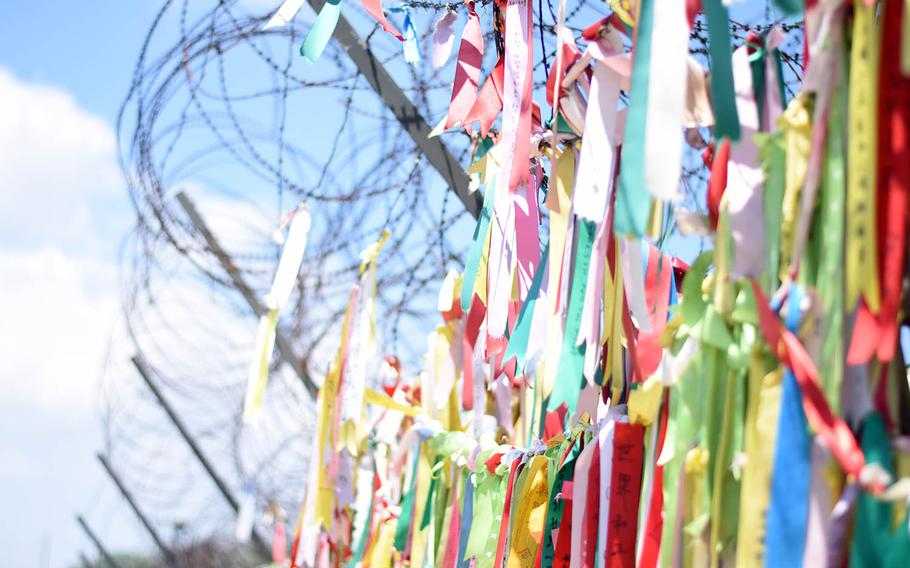
Prayer ribbons left by visitors wishing peace between North and South Korea hang from a security fence near the border in Paju, South Korea. (Aaron Kidd/Stars and Stripes)
Six out of 10 South Korean schoolchildren think unification with North Korea is necessary, according to a recent survey.
The November poll of 68,750 elementary, middle and high school students by South Korea’s education and unification ministries shows 62.3% think unification is needed, a 6.9 percentage point jump from a year earlier, Yonhap news agency reported Tuesday.
Students cited a reduced threat of war and common ethnic roots as reasons for unification, according to the report.
However, a growing number of students think unification is unnecessary - up to 24.2% from 13.7 percent in 2018 and 19.4 percent in 2019. Those students cited potential economic and social problems, Yonhap reported.
Just over half, 54.7%, of those surveyed think North Korea is a partner for cooperation, up 10.9 percentage points year-on-year, while under a quarter, 24.2%, think of North Korea as a nation to watch out for, according to the report.
Over a third of the students, 35.2%, rate Seoul-Pyongyang relations as "not peaceful,” rising for the second straight year, the agency reported.
Relations between the two Koreas have improved in recent years with North Koreans participating in the 2018 Winter Olympics in the South and twin summits between former President Donald Trump and North Korean leader Kim Jong Un.
The pair failed to make a deal that would end sanctions and denuclearize the Korean Peninsula but there has been a lull in North Korean missile and nuclear tests.
Kim’s summit with South Korean President Moon Jae-In in September 2018 may have influenced people’s thinking, according to Kim Hyun-wook, an American studies professor at Korea National Diplomatic Academy in Seoul.
“The summit meeting would have made Korean people think that two Koreas are one national identity,” he said in an email Tuesday.
South Korea’s government is promoting the idea of a single national identity and trying to spread that idea to people in North Korea. However, the effort hasn’t had much success, he said.
“[It’s] not very successful, because Kim Jong Un is not comfortable with North Korean people mingled with South Koreans,” he said.
The North Korean leader aware of how the reunification of Germany, the communist east and the democratic west, played out in the 1990s, he said.
East Germany’s last leader, Erich Honecker, stood trial for human rights abuses and died in exile in Chile in 1994.
“Kim Jong Un is the major barrier,” Kim Hyun-wook said. “He only wants to accept economic support but blocks contacts with South Koreans and information inflow into North Korea.”
robson.seth@stripes.com Twitter: @SethRobson1